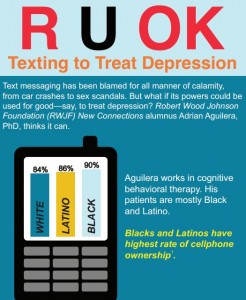
Text messaging has been blamed for all manner of calamity, from car crashes to sex scandals. But what if its powers could be used for good—say, to treat depression?
Researcher Dr. Adrian Aguilera thinks it can. Aguilera works in cognitive behavioral therapy, which aims to alter dysfunctional emotions and behaviors by teaching patients to identify and challenge negative thoughts that affect mood. Besides regular therapy sessions, patients track their moods using written questionnaires. With a response rate of only 20 percent, however, Aguilera saw room for improvement.
His simple, yet ingenious method? Automated text messages that ask patients questions such as, “What’s your mood on a scale of 1 to 9?” In responding, patients can offer additional context. Therapists then ask follow-up questions, such as “Have you noticed any thoughts that improved your mood?” Participants also get texts about group meetings, or reminders to take their medicine.
The early feedback is promising: overall, patients responded to 55 percent of the messages they received.
mHealth FTW (Mobile Health For The Win)
Aguilera first began looking at text-message solutions in 2010, after a conversation with a mentor providing interventions online got him thinking. Most of his patients at San Francisco General Hospital are from low-income populations, but data showed that the rates of basic cell phone ownership were high regardless of socioeconomic status. That made it an attractive vehicle for delivering interventions.
Aguilera was able to fully explore the practical applications of his idea through a 2011 grant from New Connections, a Robert Wood Johnson Foundation (RWJF) initiative that works to expand the diversity of perspectives informing the foundation’s program strategy.
“New Connections was instrumental in my developing this project,” he said. “It helped me do the initial testing and provided a community and mentorship.”
As his research enters clinical trials, Aguilera is excited about the future of mobile health technology, or mHealth.
“We’re at the beginning of this wave of utilizing technology,” he said. “And as more people get smartphones, interventions will become more sophisticated.”

